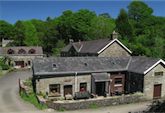“Aye, come you over by here now. I do do that sometimes. Now, there’s a thing.”
Wenglish is the name given to the dialect of English spoken in the valleys and townships of South Wales. Its idiosyncrasies can be traced to the grammar and vocabulary of the Welsh language. Characteristics include bringing additional verbs to the beginning of a sentence, an excess of auxiliaries, strange emphatic repetitions, using unlikely parts of verbs, literal translation of idioms and uses of non standard prepositions. Wikipedia lists some of the features of Wenglish as:
- Distinctive pitch differences giving a “sing-song” effect.
- Lengthening of all vowels is common in strong valleys accents.
- Pronouncing a short ‘i’ as ‘eh’ e.g. edit would become ‘ed-et’ and benefit would be ‘benefet’
- A tendency towards using an alveolar trill [r] (the ‘rolled r’) in place of an approximant [?] (the ‘normal English r’).
- Yod-dropping does not occur after any consonant, so rude and rood, threw and through, chews and choose, chute and shoot, for example, are distinct.
- Sometimes adding the word “like” to the end of a sentence for emphasis, or using it as a stop-gaps.
The term “Wenglish” was popularised by John Edwards, whose books on the peculiarities of the Welsh/English dialect, Talk Tidy and More Talk Tidy are hugely popular. The original books Talk Tidy, and More Talk Tidy, were written in 1985 and 1986 respectively and though they have been out of print for a long time, are now available once more. John Edwards has also recorded a series of CD’s demonstrating Wenglish ‘in use’. All are available for purchase at his live talks, or direct from him at his home address which is given on his Talk Tidy website.
